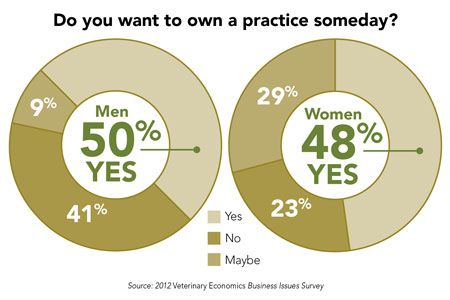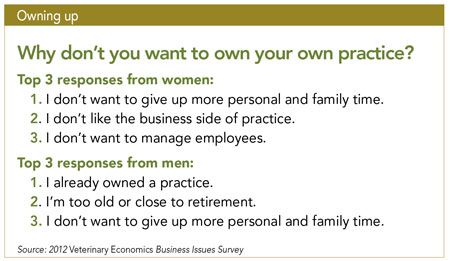Practice ownership: What's keeping out associates?
Many associate veterinarians are committed to owning a practice one day, but others are still on the fence. Our experts break down the reasons behind the reluctance.
Next >
In the 2010 Veterinary Economics Business Issues Survey, 24 percent of female associates and 45 percent of male associates said they wanted to own a veterinary practice. While those numbers haven’t changed much for men, in two years the percentage of women interested in practice ownership has doubled. That’s good news for practice owners looking to sell, right?
Unfortunately, it might not be that straightforward. Of the female respondents who say they want to own a practice someday, 70 percent are under the age of 30. Will that interest wane once those young veterinarians have a few more years of practice under their belt? Current practice owners could still face some tough challenges when they’re ready to sell.

To get the inside scoop on the situation, Veterinary Economics asked our panel of experts to weigh in on the pros and cons of practice ownership and give both practice owners and associates some insight into what lies ahead.
One big obstacle most associates face when contemplating practice ownership is fear—fear that the business will fail or fear that they’ll have to sacrifice too much family or personal time to keep the practice running. While these fears are reasonable, in the experience of Dr. Craig Woloshyn, a Veterinary Economics Editorial Advisory Board member and owner of Sun Dog Veterinary Consulting, most of the fear is simply that—fear, not reality. And he’s a firm believer that fear can be overcome with the right information.
“The failure of your business is a real possibility,” Dr. Woloshyn says. “But that just means you have to plan better, be smart with your business plan, and execute that plan with confidence.” Fears of fiscal failure or a lack of personal fulfillment are two more common fears he hears from today’s veterinary associates.
Dr. Woloshyn acknowledges that it does take a lot of money to start a practice and, yes, if it fails, new owners could be in deep water financially. But he also points out that if you’re successful, owning a practice will provide a much greater income than being an associate ever will.
Because associates today are more sensitive to issues of work-life balance, Dr. Woloshyn reminds everyone that owners can have an upper hand in this arena too.
“Owners can shape their practice to suit their personal preferences,” he says. “They can adjust their hours, their staff, and the type of practice they want and balance all of it with the time they need for their personal life.”
Still, some veterinarians just don’t have the desire or personality to be owners. Dr. Shawn Finch, another Veterinary Economics Editorial Advisory Board member and associate veterinarian at Gentle Doctor Animal Hospitals in Omaha, Neb., never wants to own a practice, but she appreciates that certain people possess the strengths and skills to own and the passion to do it. It just doesn’t appeal to her.
“I love being an associate,” Dr. Finch says. “And I like that veterinary medicine is diverse enough that a veterinarian can reach his or her full potential as an associate or an owner, or in a different role entirely. I feel as though I still have tons more personal and professional growing to do. I can’t imagine getting bored in this role.”
